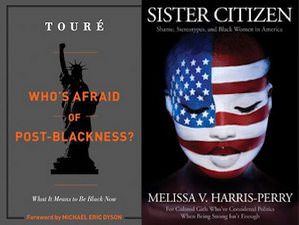What Does It Mean to Be Black?
Two new books take radically different approaches to questions of race introspection -- one academic, the other anecdotal.
“Who’s Afraid of Post-Blackness?: What It Means to Be Black Now” A book by Touré
“Sister Citizen: Shame, Stereotypes, and Black Women in America” A book by Melissa V. Harris-Perry
I am just old enough to remember when having someone call you black, rather than Negro, was considered a serious slur. Still, when it did occur, my parents taught me, even then, to say “thank you” in response. This turned out to be a highly effective way to disarm the insult and the insulter.
Sister Citizen: Shame, Stereotypes, and Black Women in America
By Melissa V. Harris-Perry
Yale University Press, 392 pages
Who’s Afraid of Post-Blackness?: What It Means to Be Black Now
By Touré and Michael Eric Dyson
Free Press, 272 pages
In this way, I learned the power of not letting others decide how I would be defined. I did not need James Brown to tell me to be black and proud.
Decades later, Americans are still struggling with racial definitions. Is the president black or biracial? Are we Latino or Hispanic? Is the n-word an insult or an affectionate term? What does it mean to be authentically black? And does any of that matter anymore? Didn’t the 2008 election signal that the country that elected its first black president is now post-racial?
Two new books take radically different approaches to these questions of race introspection — one academic, the other anecdotal. Both are mature and serious works that seek to get us past our laziest assumptions about race. Each managed to expand my notion of what it means to be black in America, and why it matters.
The more readable and entertaining of the two is pop-culture journalist Touré’s “Who’s Afraid of Post-Blackness?” With liberal doses of personal experience, Touré demolishes the notion that there is only one way to be racially authentic.
He is, after all, a black man who went to prep school, jumps out of planes, interviews rock stars, raises biracial children and pretty much sets out to explode a new black-male stereotype every day. He is well aware of what it means to see someone cross the street as he approaches after sunset, but he resists assignment editors at music magazines who believe he is equipped only to write about rap. “Why’s blackness validated by a trip to jail,” he writes, “and challenged by a stint at Yale?”
Touré very specifically rejects the notion that America is now post-racial. Instead he makes an argument for what he calls post-blackness. America is not (and should not necessarily be) past race, he writes. But black people need to expand their notion of what it means to be black to include a new generation that embraces the “racial ambidexterity” defined by entertainers like Dave Chappelle and politicians like President Barack Obama.
But he skips lightly over the unique experiences of African-American women. For that, it’s better to turn to “Sister Citizen,” in which Melissa V. Harris-Perry, a political science professor at Tulane University, applies a social scientist’s rigor, complete with focus groups and regression analysis.
Escaping the bounds of false definition, she writes, is a tougher task for black women than for men. Throughout history, they have often been shoehorned into three constraining stereotypes: the nurturing mammy, the lascivious Jezebel and the stiff-necked, unyielding matriarch. Each of these archetypes, she argues, imposes a crazy quilt of limitation on anyone striving to decide for herself who she is. “Strong is the default category for describing black women,” she writes. “But the myth leaves them sicker, less satisfied and more burdened than any other group.”
Harris-Perry’s central premise is that African-American women are “misrecognized,” not only by society but often by themselves. This misrecognition morphs into stunted expectation that in turn breeds shame and racism.
But Harris-Perry does not hold white people solely responsible. Like Touré’s, her work is introspective. She directs pointed critiques at black churches and at the civil rights movement, which relied on women to organize and execute, but seldom welcomed them to the stage.
|
To see long excerpts from “Who’s Afraid of Post-Blackness?” at Google Books, click here. |
Both books cover an important new front in America’s continuing battles over black and white. It turns out there are dozens of shades of gray. That gray is rooted in misunderstanding, misapprehension and misrecognition, too. Each of these provides unique challenges, and neither Touré nor Harris-Perry seems particularly convinced in the end that Americans are prepared to tackle these redefinitions.
|
To see long excerpts from “Sister Citizen” at Google Books, click here. |
I can’t say I am, either. But at least now I know what my parents were up to when they told me to thank the insulters. Getting to define oneself can be the ultimate victory. But to fully appreciate that win, we first have to acknowledge the limitations we have placed on ourselves.
Gwen Ifill is a PBS correspondent and the author of “The Breakthrough: Politics and Race in the Age of Obama.” © 2011, Washington Post Book World Service/Washington Post Writers Group
Your support matters…Independent journalism is under threat and overshadowed by heavily funded mainstream media.
You can help level the playing field. Become a member.
Your tax-deductible contribution keeps us digging beneath the headlines to give you thought-provoking, investigative reporting and analysis that unearths what's really happening- without compromise.
Give today to support our courageous, independent journalists.








You need to be a supporter to comment.
There are currently no responses to this article.
Be the first to respond.